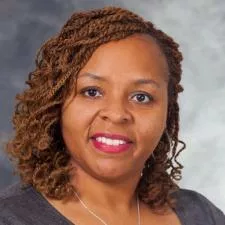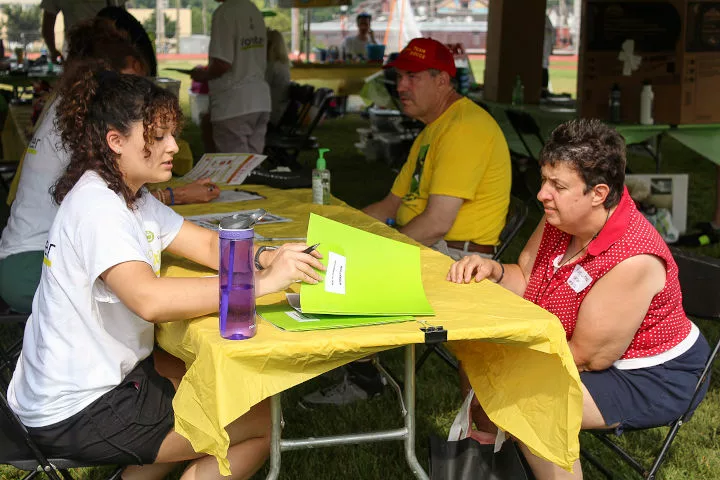Master of Public Health Students Are Champions of Change
For students who are pursuing a master of public health (MPH) degree at the University of Wisconsin School of Medicine and Public Health, the Applied Practice Experience (APEX) is an opportunity to define their future careers and to put didactic learning into practice in a community-based setting. This concept is the heart of UW–Madison’s guiding principle — the Wisconsin Idea.
Overall, the MPH Program, led by Ajay K. Sethi, PhD, MHS, associate professor of population health sciences, provides a practice-oriented approach for those who want to strengthen their general knowledge and skills in public health. MPH students complete their 240-hour, six credit APEX in community settings such as public health agencies, clinics and non-profit organizations during the eight-week summer session or throughout the academic year.
Community Engagement Coordinator Tarakee Jackson coaches students throughout the APEX program beginning with a spring semester seminar. She connects students with community partners and works with them to define the focus of their project and create an APEX Learning Agreement.

“I always tell students that the APEX is the precursor for their careers, this is going to help identify what they want to do after graduation, so they should take to heart what type of project they want to do,” she explains.
In addition to working with students to integrate public health core competencies into their APEX, Jackson also centers seminar discussions around the need to have cultural humility and competency when working with the community.
“In public health, it is critical to identify what your values and ethics are, because in your work, you’re trying to build the trust of a community, and often that community has been hurt, misled or misrepresented in the past,” she says. “For instance, if you’re a white female, and you’re trying to gain the trust of an all-Latino community, you need to know how to engage with staff within that population and community organization.”
When students feel uncertain about how to approach the work because they don’t share the same lived experience with the community, Jackson is there to encourage and coach them as they navigate their way.
She says, “At times, you’re going to have to let the community teach you, and then you fall back on knowledge you have gained in courses. And, I’m also here when students hit those stress points that every student hits.”
Jackson says the reward is seeing APEX projects — such as the following examples — create remarkable outcomes for the students and communities they serve, with students bringing fresh perspectives and unique skills to organizations that are often short-staffed.
Advocating for Special Olympics
Vanessa Dingman, an MPH student, is interested in health policy that supports individuals with disabilities. She had worked at the Wisconsin Department of Health on quality initiatives for children’s Medicaid waiver programs and was curious about how a public health perspective could be used to leverage change.
As Special Olympics Wisconsin staff were fully focused on adapting programs due to the pandemic, Dingman filled an urgent need for the organization, which hopes to increase state funding — something that hasn’t changed in 30 years. She worked closely with the executive director, the lobbying firm and the Athlete Leadership Council to create a two-year advocacy plan — following the legislative session — that included steps the organization could take each quarter. She also developed a training program for athletes who are interested in becoming advocates.

Dingman came away with a better sense of how legislators may consider an issue and how the legislative process works, as well as the different ways government agencies can provide benefits to communities.
She reflects, “When I shifted to public health, I got a sense of community and coming together to support one another. Medicaid funds have some limitations and serve a specific purpose, while public health builds upon assets available in a community.”
Volunteering at the Special Olympics Wisconsin Summer Games was a highlight.
“A big principle of public health is community engagement, and I really wanted to meet our athletes. It was so great to talk with them and get a sense of what they were doing in an asset-based environment, where they were playing games and winning, and where the focus was on how awesome they are as athletes,” recalls Dingman.
Improving Screenings for Southeast Asian Women
Baila Khan wanted to explore how preventive practice could improve health equity. She felt called to work with the Milwaukee Consortium for Hmong Health because of its work with immigrant and refugee populations — something she could relate to as a Muslim woman and the daughter of parents who immigrated from Pakistan.
Khan conducted a data analysis of the consortium’s Breast and Cervical Cancer Programs to measure the effectiveness of outreach and education efforts by community health workers, with the goal of increasing the number of Southeast Asian women being screened.
“It’s been shown through multiple studies that targeted practice works to enhance health equity and engage these communities in approaching topics that are hard to explain,” Khan says. “Many people in these populations struggle to read or write their own language when coming from refugee camps. It’s even more difficult when they are expected to do this in English.”
Screening rates were compared across ethnicity and insurance type, but the consortium also wanted to understand women’s attitudes about screenings.
“Breast and cervical cancer screenings are likely to be very stigmatized or not talked about,” Khan explains. “I know that’s true in my culture, and I’ve learned from Hmong, Burmese and Lao individuals that these topics are stigmatized in their cultures, too.”
Working with Maichou Lor, PhD, RN, assistant professor, UW School of Nursing — who earned her degrees at UW–Madison and was the first Hmong-American nurse to earn a doctoral degree in the United States — as her preceptor was a highlight for Khan, who notes, “She was my first mentor who was a woman of color. I think we made a great duo.”
Given the limited number of studies focused on this area, Khan believes her report, which is under review, will be published and widely disseminated.
Promoting Weight Inclusivity
As a future family medicine physician, Aimée Wattiaux advocates for a weight-inclusive philosophy that respects body diversity and recognizes the harm of focusing on a person’s body mass index (BMI). On the rare occasion that weight is relevant to the visit, she says it should be part of a larger conversation.
“I never want the focus to be just on changing the person’s weight,” says Wattiaux, who will earn her medical degree from the UW in spring 2022 and enter a residency in the school’s Department of Family Medicine and Community Health. “If I’m following someone’s weight, and I see that it suddenly goes up or down, it’s a cue to ask a patient about what’s going on. Are you extremely stressed? Are you food-insecure? Is there something we should focus on? It’s a cue to look at other aspects of a person’s health.”
Wattiaux partnered with the UW Health Dietetic Internship Program to create a series of 17 micro-learning opportunities for dietitian weekly huddles, and she adapted them for a broader health care audience. She also created “Weight-Inclusive Care: A Toolkit.” Topics include weight stigma, personal weight bias, and how to set the tone for conversations about weight.
Further, she partnered with the Providers and Teens Communicating for Health (PATCH) Program to host teen focus groups to learn about their personal experiences with discussions around weight — something that provided validation for the weight-neutral approach. Many teens expressed embarrassment about being weighed in public or in front of their parents.
Recalling how one teen’s story illustrated the need for a change, Wattiaux shares, “The participant was an athlete and very active, but her BMI was elevated. She told me, ‘I’m healthy. I’m super active, so it feels weird to look at my growth chart and have people say it’s on the higher end.’ And then she said something poignant: ‘I wish we could talk about health, exercise and nutrition without it always coming back to being about weight.’ And I said, ‘Me, too!’”
Sharing Perspectives
Self-proclaimed “data geek” Kayla Carlin provided qualitative data analysis to support the “Pick Up the Mic” podcast created to give Black students and community leaders a voice and opportunity to share their perspectives and experiences related to racial disparities in education.
The podcast was the vision of Corey Whitmore, the Lussier Community Education Center WWMV-LP 95.5 FM station manager and Media 22 owner, who felt it was time for a different kind of conversation as Wisconsin was ranked the state with the biggest achievement gap in the country.
Whitmore had the lived experience of being a Black student attending many schools around the country, and he had the skills to produce and market the podcast, as well as a Minority Health grant from the Wisconsin Department of Health to fund it. He needed someone with qualitative skills to demonstrate outcomes and impact. That’s where Carlin stepped in, with Whitmore as her preceptor.
“I felt called to the work knowing that education and health is a right. I see public health professionals as these grand mediators — pulling and collaborating with other people — and that’s an important value for me, too,” shares Carlin.
About the data they gathered, Whitmore says, “Relationships were the baseline between students and teachers and, in some cases, between students. They gave a number of examples of traumatic experiences, and we would try to dive into understanding ‘What has been the negative outcome now that these things have happened?’”
He continues, “On the flip side, if a student was having a bad day and teachers were asking the student, ‘What’s going on? Is there anything I can do to support you?’ then they described a feeling of understanding and connection.”
More than 25 juniors and seniors from the Madison Metropolitan School District and community leaders shared their reflections on topics such as code-switching in the learning environment, standardized testing and the achievement gap. The next podcast series will focus on high schools in communities surrounding Madison.
Whitmore has undergone a grassroots effort to share the podcasts and information learned with key individuals in area school districts.
“Change is going to take time, but we’re trying to build the foundation for that,” he says.
Continuing the Tradition
Jackson notes that APEX projects usually begin in the summer. Class sizes vary, but an average of 35 to 40 students are enrolled in the MPH Program at any given time. Program leaders are proud of the major impact the students make through their APEX projects, as well as in their future careers using the knowledge and skills they gain.